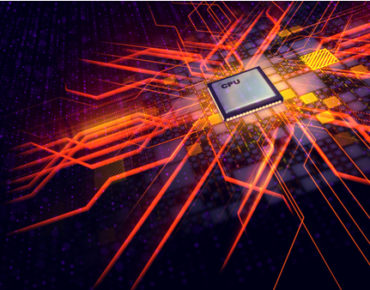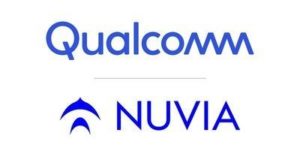Qualcomm’s $1.4B Deal for Nuvia a Good Move: Analysts

Qualcomm apparently isn’t letting the bitter memories of its failed $47 billion attempt to acquire NXP Semiconductor in 2018 halt its growth plans. Instead, the company’s latest $1.4 acquisition proposal, this time for processor startup Nuvia, could help Qualcomm get right back onto its planned path of diving more deeply into the CPU and SoC chip marketplace.
That’s the consensus of several IT analysts who spoke with EnterpriseAI about Qualcomm’s latest plans, which were unveiled Wednesday (Jan. 13), by its subsidiary, Qualcomm Technologies.
By acquiring Nuvia, Qualcomm says the deal would build on its existing Snapdragon chip, digital signal processor, AI engines and other product lines, while bringing further improvements in CPU performance and power efficiency to meet the demands of next-generation 5G computing. That could mean seeing Nuvia CPUs integrated across flagship smartphones, next-generation laptops, digital cockpits, Advanced Driver Assistance Systems, infrastructure networking and more, according to the companies.
Founded in February of 2019, Nuvia specializes in high-performance processors, System on a Chip (SoC) designs and power management for compute-intensive devices and applications, according to the company.
5G Helped Inspire the Acquisition: Analyst
“It seems likely that the emergence of workable 5G was a prime driver for this deal,” Charles King, the principal analyst of Pund-IT, told EnterpriseAI. “5G adoption is clearly still in early days so there should be plenty of time for Qualcomm to strengthen its portfolio with Nuvia’s technologies and design work.”
In addition, the $1.4 billion price isn't exorbitant and the deal will allow Qualcomm to move more quickly and assuredly than it would be developing similar technologies itself, said King.
Another analyst, Maribel Lopez, principal of Lopez Research, said the deal is a likely harbinger of what is to come in the new year. “2021 is going to be an epic year for mergers and acquisitions,” said Lopez. “A lot of people are going to say it may or may not be the go-go days for the next couple of years, but if there's a good strategic fit, just take the money and run.”
Other recent activity in the chip marketplace, including the planned $40 billion acquisition of Arm by Nvidia last September, has changed the game, she said.
“I know everybody's down on Intel, but the reality is they have a pretty big portfolio of products,” said Lopez. “Once Nvidia rolls in and gets Arm, you've got a second vertically-integrated chip company.”
For Qualcomm, acquiring Nuvia could be a great fit, she said. “If you give them the right set of assets, in this case having a good CPU would make sense. Then they're one of the other integrated companies. And there's really room for three, not four [such companies].”
For Nuvia and other chip startups, the question typically comes up about whether they should marry up with another company, said Lopez. And the answer should be simple once they think about it, she added.
“Yes, you're going to marry up to somebody,” said Lopez. “Running on your own isn't very easy. So, the smart play would be to go with somebody else who's considered a long-standing company that you're not really worried will go away. Nobody's sitting around saying, ‘Qualcomm is going to go away.’”
Qualcomm Acquisition Gives Nuvia More Traction
For startup Nuvia, being acquired is just what it needs to ever hope to successfully battle it out with the big boys in the marketplace, said Lopez. “It's the only way they can take on Intel and AMD,” she said. “They weren't going to take them on by themselves. In this case, it's a fairly complimentary fit so it's not like you're getting rid of one technology for another. You're additive.”
The question now for Qualcomm, however, is whether there are any other product categories the company also needs to add to grow its market share, said Lopez.
“If you look at a company like Intel, they have vision processing units and other technologies as well,” she said. “Is this [Nuvia acquisition] enough for Qualcomm, or is there something else that they should be doing? Just because they are making this acquisition doesn't guarantee that it's a seamless transition to them selling CPU products. You just don't roll up to OEMs that have been doing business with somebody like Intel for decades and say, ‘oh, pick me, pick me.’ It's a long design-win cycle.”
Karl Freund, a senior analyst for HPC and deep learning with Moor Insights & Strategy, said the announcement caught him by surprise, but that in hindsight Nuvia “has a real shot at shaking up the CPU space. Their design could produce a chip that is faster than anything out there today.”
The move makes sense for Qualcomm, particularly after it dropped its own Arm CPU design a few years ago and is now wrapping up its own AI accelerator to enter the data center, said Freund. “Now they can couple that with a Nuvia CPU to compete with Nvidia, and/or enhance their Snapdragon performance with Nuvia’s design. This might also give Qualcomm an off ramp from Arm, if needed. While I believe Nuvia’s current design is based on Arm, I have been told they are able to pivot to RISC-V should the Nvidia acquisition of Arm proves problematic.”
Acquiring Nuvia Brings New Talent for Qualcomm
Another analyst, James Kobielus, principal of Franconia Research, said he sees some evidence of Qualcomm buying the startup so it can acquire its rich talent pool.
“This sounds like an acqui-hire on Qualcomm’s part to keep pace with Nvidia in the battle for the mobile/edge/IoT SoC marketplace, on the assumption that the Arm acquisition will be approved by regulators and closes this year,” said Kobielus. “Yes, Qualcomm was dismayed by the anti-Chinese hysteria that torpedoed its intended acquisition of NXP in 2018, but there are plenty of other silicon design and IP shops who can provide the CPU architectures necessary to build robust SoCs for mobile/edge markets.”
For Qualcomm, “Nuvia rapidly emerged in 2019 as a credible domestic alternative that probably won’t raise any national security alarm bells that would deter U.S. regulators from approving the deal, said Kobielus. “By contrast, U.K. regulators could still put the big kibosh on Nvidia’s proposed acquisition of Arm.”
The deal is good for Nuvia, he said, because “Qualcomm will provide the burst of capital needed to fund the R&D into advanced multicore CPU architectures in order to keep pace with the likes of Nvidia, Arm, Intel and AMD in this race. Qualcomm has the AI-on-SoC products that will be critical pieces of this overall push.”
Since Nuvia is a much younger firm in the edge CPU space, compared to larger competitors with broader assets and ecosystem partners, “at best, this Nuvia acquisition will beef up Qualcomm R&D in this arena, but it will be insufficient without Qualcomm making more strategic acquisition for AI-on-SOC IP providers,” added Kobielus.
Jim Handy, a semiconductor and SSD market analyst with Objective Analysis, said Qualcomm’s failed 2018 deal for NXP came apart when the U.S. was rattling China’s cage and caused the Chinese government to nix the deal. “Had it happened a month or two earlier it would have been rubber stamped, but when China’s chain was yanked the approval body became unresponsive and Qualcomm finally gave up.”
Similar complications shouldn’t arise this time, said Handy. “I doubt that Nuvia has anything in China, so that might alleviate any worries. Also, it looks like the new [Biden] administration will make the US/China relationship more predictable. Both point in favor of a smoother acquisition.”
A Jan. 13 research note from Seeking Alpha calls the latest planned acquisition by Qualcomm “a huge move for Qualcomm. It lets them put Nuvia’s highly-anticipated CPU designs in existing lines, and also puts them into the data center CPU game. It also comes relatively cheap.”
The deal could even be the “most consequential moment ever for Qualcomm,” the report continued. “They are making a move to scale up dramatically. This isn’t any old acquisition; this could have huge effects on Qualcomm’s product lines,” including revitalizing its Snapdragon smartphone SoCs to becoming the platform of choice for the emerging Arm Windows laptop and desktop ecosystem, the report states. “I was waiting to see who would make this move, and I thought it would be AMD. But Qualcomm makes more sense, in hindsight, because they need more help.”
Nuvia’s Founders to Join Qualcomm Under the Deal
Under the planned acquisition, which will be subject to customary closing conditions, including regulatory approval, Nuvia’s co-founders Gerard Williams III, Manu Gulati and John Bruno will join Qualcomm, along with Nuvia’s other employees.
Williams, the company’s CEO, came to Nuvia from Apple, where he was a senior director and chief CPU architect for nearly a decade with responsibilities for a range of leading-edge CPUs and SoCs across a broad array of devices. He previously spent more than 10 years at Arm, where he was an Arm Fellow and served on the Arm Architectural Review and Technical Advisory Boards. Williams began his career with Intel and Texas Instruments and holds 38 patents to date.
Gulati is Nuvia’s senior vice president of silicon engineering and came to the company from Google, where he was the lead SoC Architect for consumer hardware, playing a key role in defining the company’s silicon and product roadmaps. Before joining Google, Gulati spent eight years at Apple as the lead SoC architect responsible for numerous Apple leading-edge mobile SoCs across a range of devices.
Bruno, Nuvia’s senior vice president of system engineering, also came to the company from Google, where he worked as a system architect, driving SoC definitions and competitive performance and power analysis. He worked at Apple for five years, including being the founder of Apple’s silicon competitive analysis team, before joining Google.














